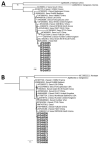Seoul Orthohantavirus in Wild Black Rats, Senegal, 2012-2013
- PMID: 32946728
- PMCID: PMC7510722
- DOI: 10.3201/eid2610.201306
Seoul Orthohantavirus in Wild Black Rats, Senegal, 2012-2013
Abstract
Hantaviruses cause hemorrhagic fever in humans worldwide. However, few hantavirus surveillance campaigns occur in Africa. We detected Seoul orthohantavirus in black rats in Senegal, although we did not find serologic evidence of this disease in humans. These findings highlight the need for increased surveillance of hantaviruses in this region.
Keywords: Hantavirus; Rattus rattus; Senegal; Seoul orthohantavirus; black rats; rodents; viruses; zoonoses.
Figures


References
Publication types
MeSH terms
LinkOut - more resources
Full Text Sources
Medical

